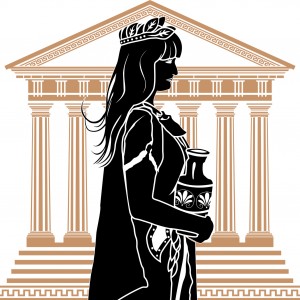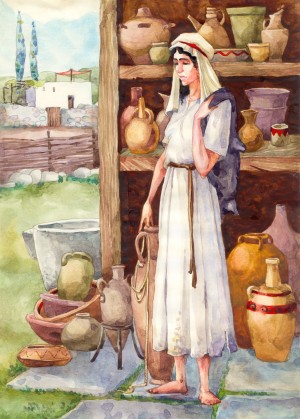The year is about AD 30. The place is Jerusalem. Life here is tough for women. Which woman is an important witness of Jesus’ resurrection? Why a woman?
Have you ever wished you could travel to another time in history on something like the Magic School Bus to meet the people who lived back then? We can pretend. Let’s get on our imaginary school bus and travel back in time to visit people who really lived years ago. Buckle your seat belts! We’re on our way to around the year 30 to meet a special woman for Women’s History Month.
What was it like to be a woman in Ancient Rome?
Well, that would depend on how much money your husband and his family had. It also depended on where you lived in the Ancient Roman Empire.
The Roman Empire spread around the Mediterranean Sea. It included much of Europe, the eastern part of Asia, and north Africa. Rome was the capital and it was the world’s largest city.
What did women look like? Women liked to color their hair brown and wear it up in fancy braids (unlike the picture below). They also shaved their eyebrows. Yes, really. They thought it helped them look bored. The way a woman was dressed told you if a lady was rich or poor, married or not. The clothes were colorful, fashionable, practical, and modest. (See some pictures and learn more about women’s fashion in Ancient Rome on this website.)
The Romans made sure that most everyone spoke Greek. This helped people do business with one another from different parts of the Roman Empire. Someone from Spain could talk and barter with someone from Egypt so they could sell their goods.
Rich women considered work something only slaves and poor people did. People who were not rich had to work very hard for food to eat. Many people went hungry.
Men who liked to think and debate would meet together and discuss philosophy (thinking about how you think about things). Socrates, Plato, and Aristotle had lived not too long before that. Now they listened to men like Cicero. Cicero liked to ask questions like, “How do you know?”
Girls didn’t go to school and were not allowed to join the men talking about philosophy. At the beginning of Ancient Rome, no one listened or cared what women thought or said. However, by the end of the first century, some men would ask their wives for advice in private and then act as they saw fit. Other advancements in the rights of women happened in the first century AD.
Life was still hard, though, especially for people without a lot of money. There was a lot of sickness and death. Babies were more likely to get sick and until modern medicine learned about germs, lots of babies and new mothers died.
What about Jewish women in Israel around AD 30?
Marriage and family were really important to people who lived in the Roman Empire. This was true in Israel too. If you were a Jewish girl, you were probably married by age twelve-and-a-half. Your dad would arrange your marriage to whoever he liked. If you were lucky, he’d ask your thoughts, but you didn’t have a choice who you would marry.
If your husband died and you had no children to earn money to help you live, you were out of luck. The Jewish religious leaders were supposed to live for God and take care of the widows and orphans, but some of them cheated these women (James 1:27; Mark 12:38-40).
Why a woman?
Ok. We’ve learned that women weren’t very respected in Ancient Rome, even in Israel where they knew that God had told people to love and care for women. That is why I find this so very interesting. Do you know who Jesus told first than He had come back to life? Women!
The women were the first to come back to Jesus’ tomb, His grave, Easter morning. They found it empty and ran back to tell the disciples. The male disciples did not believe them and came to look for themselves. All they found was an empty grave, but they went back home with no answers. Then look what happened:
But Mary stood outside the tomb crying. As she cried, she bent over to look into the tomb. She saw two angels dressed in white. They were seated where Jesus’ body had been. One of them was where Jesus’ head had been laid. The other sat where his feet had been placed.
They asked her, “Woman, why are you crying?”
“They have taken my Lord away,” she said. “I don’t know where they have put him.” Then she turned around and saw Jesus standing there. But she didn’t realize that it was Jesus.
He asked her, “Woman, why are you crying? Who are you looking for?”
She thought he was the gardener. So she said, “Sir, did you carry him away? Tell me where you put him. Then I will go and get him.”
Jesus said to her, “Mary.”
She turned toward him. Then she cried out in the Aramaic language, “Rabboni!” Rabboni means Teacher.
Jesus said, “Do not hold on to me. I have not yet ascended to the Father. Instead, go to those who believe in me. Tell them, ‘I am ascending to my Father and your Father, to my God and your God.’ ”
Mary Magdalene went to the disciples with the news. She said, “I have seen the Lord!” And she told them that he had said these things to her.
John 20:11-18 (NIRV)
Jesus told a woman He was alive before anyone else. Mary Magdalene was the first one to get to see Jesus alive again. She and her friends were the first ones to get to tell others that Jesus was not dead, but alive!
God likes to choose people others might overlook.
Brothers and sisters, think of what you were when God chose you. Not many of you were considered wise by human standards. Not many of you were powerful. Not many of you belonged to important families. But God chose the foolish things of the world to shame the wise. God chose the weak things of the world to shame the strong. God chose the things of this world that are common and looked down on. God chose things considered unimportant to do away with things considered important. So no one can boast to God.
1 Corinthians 1:26-29 (NIRV)
What about you?
Are you important? Do you have a lot of money? Do people listen to you all the time? If so, you have a lot of influence and can make a big influence for Christ if you don’t get distracted by all those things.
If you’re like most of us, you don’t have those things. Guess what? God can use you in incredible ways too! Will you let Him? All it takes is giving your life to Jesus and living for Him.
As you pray today, thank God for Mary Magdalene’s example. Ask Him to help you live for Jesus, even when you don’t feel very important.
What do you find encouraging about Mary Magdalene’s story? What else do you know about her? Has she given you any ideas of how to live for Christ? Be sure to ask an adult to help you tell us about it in the comments below.
Why study biblical backgrounds and church history?
History doesn’t have to be a dry, dusty subject of boring people who lived a long time ago. These were people who had to live one day at a time, just like we do, and make the best decisions they could, just like us. Some of them wore funny clothes, but some of the clothes your parents wore when they were kids look funny now too. That’s what happens with time.
“Biblical backgrounds” is a fancy way to say, “What was life like during Bible times?” It fits right in with church history. Church history is an extra special type of history because these people did their best to live for Jesus. It looks a people and events connected with the Christian church from Pentecost (Acts 2) to today. Are you trying to live for Jesus too? Is it always easy? It wasn’t for them. When we learn about the hard decisions they made and how God used them, it can encourage us to live for Jesus, no matter what.
A huge cloud of witnesses is all around us. So let us throw off everything that stands in our way. Let us throw off any sin that holds on to us so tightly. And let us keep on running the race marked out for us. Let us keep looking to Jesus. He is the one who started this journey of faith.
Hebrews 12:1-2 (NIRV)
Sources used for this post
As always, be sure to have an adult read these websites before you do.
- “Roman Philosophy” by Professor K.E. Carr. Read more: http://www.historyforkids.org/learn/romans/philosophy/#!
- “Chapters 1-4 form miladies” by iamtrinket.
- “Women in Ancient Rome” by James C. Thompson. Read more: http://www.womenintheancientworld.com/women_in_ancient_rome.htm
- “Roman Costume History: Roman Women – Hairstyles and Dress” by Pauline Weston Thomas. Read more: http://www.fashion-era.com/ancient_costume/roman-costume-history-women-hair.htm
 This post is part of a Titus 2 Tuesday link up party. Get more encouragement here.
This post is part of a Titus 2 Tuesday link up party. Get more encouragement here.









